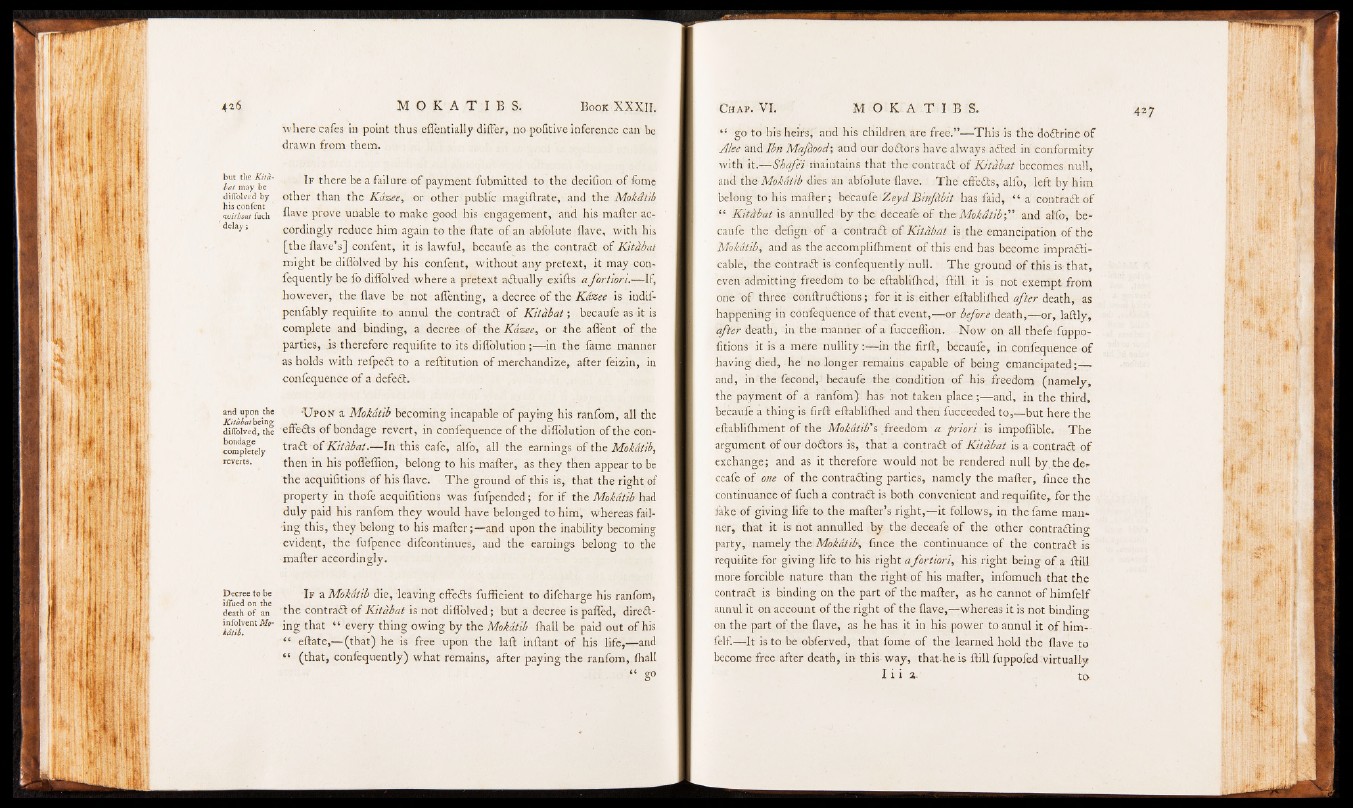
but the Kitala
t may be
diflolved by
his confent
«without fuch
' delay ;
and upon the
K ita b a t b tm g
diflolved, the
bondage
completely
reverts.
Decree to be
iflued on the
death o f an
infolvent Mo-
id t ib .
where cafes in point thus eflentially differ, no pofitive inference can be
drawn from them.
If there be a failure of payment fubmitted to the decifion of fome
other than the Kdzee, or other public magiftrate, and the Mokdtib
Have prove unable to make good his engagement, and his mafter accordingly
reduce him again to the Bate of an abfolute flave, with his
[the flave’s] confent, it is lawful, becaufe as the contradt of Kitabat
might be diflolved by his confent, without any pretext, it may con-
fequently be fo diflolved where a pretext adtually exifts a fortiori.— If,
however, the flave be not aflenting, a decree of the Kdzee is indif-
penfably requifite to annul the contract of Kitabat; becaufe as it is
complete and binding, a decree of the Kdzee, or the afl'ent of the
parties, .is therefore requifite to its diflolution;— in the fame manner
as holds with refpedt to a reftitution of merchandize, after feizin, in
confequence of a defedt.
“Upon a Mokdtib becoming incapable of paying his ranfom, all the
effedts.of bondage revert, in confequence of the diflolution of the con-
traft of Kiidbat.— In this cafe, alfo, all the earnings of the Mokdtib,
then in his pofieflion, belong to his mafter, as they then appear to be
the acquifitions of his flave. T h e ground of this is, that the right of
property in thofe acquifitions was fufpended; for if the Mokdtib had
duly paid his ranfom they would have belonged to him, whereas failing
this, they belong to his mafter;—and upon the inability becoming
evident, the fufpence difcontinues, and the earnings belong to the
mafter accordingly.
If a Mokdtib die, leaving effects fuflicient to difcharge his ranfom,
the contradt of Kitabat is not diflolved; but a decree is palled, diredt-
ing that “ every thing owing by the Mokdtib ftiall be paid out of his
“ eftate,— (that) he is free upon the laft inftant of his life,— and
“ (that, confequently) what remains, after paying the ranfom, ftiall
m go
“ go to his heirs; and his children are frefe.”— This is the dodtrine of
Alee and Ibn Majaood; and our dodtors have always adted in conformity
with it.— Shdfei maintains that the contradt of Kitabat hecomes null,
and the. Mokdtib dies an abfolute flave. The effedts, alfo, left by him
belong to his mafter; hecàuieZeyd Binfàbit has faid, “ a contradt of
“ Kitabat is annulled by the deceafe of the Mokdtib-," and alfo, becaufe
the defign of a contradt of Kitabat is the emancipation of the
Mokdtibi and as the accomplishment of this end has become impradti-
cable, the contradt is confequently null. The ground o f this is that,
even admitting freedom to be eftablilhed, ftill it is not exempt from
one of three conftrudtions ; for it is either eftabliihed after death, as
happening in confequence of that event,— or before death,— or, laftly,
after death, in the manner of a fucceflion. Now on all thefe fuppo-
fitions it is a mere nullity :— in the firft, bëcaufe, in confequence of
having died, he no longer remains capable of being emancipated;—
and, in the fécond,‘ becaufe the condition o f his freedom (namely,
the payment o f a ranfom) has not taken place ;— and, in the third,
becaufe a thing is firft eftabliihed and then fucceeded to,— but here the
eftabliftiment of the Mokdtib’ s freedom a priori is impoflible. The
argument of our dodtors is, that a contradt of Kitabat is a contradt of
exchange; and as it therefore would not be rendered null by.the de-
ceafe of one of the contradting parties, namely the mafter, fince the
continuance of fuch a contradt is both convenient and requifite,. for the
fake of giving life to the mailer's right,—it follows, in the fame manner,
that it is not annulled hy the deceafe of the other contradtino-
party, namely the Mokdtib, fince the continuance of the contradt is
requifite for giving life to his right a fortiori, his right being of a ftill
more forcible nature than the right of his mafter, infomuch that the
contradt is binding on the part of the mafter, as he cannot of himfelf
annul it on account of the right of the flave,— whereas it is not binding
on the part of the Have, as he has it in his power to annul it o f himfelf.—
It is to be obferved, that fome of the learned hold the flave to
become free after death, in this way, that he is ftill fuppofed virtually
I i i 2 to